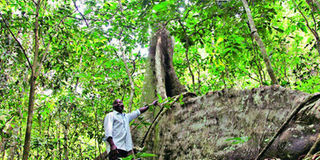WHO must explain the Uganda Zika risk claim

Disease control. A researcher inspects Zika forest on Entebbe Road last year.
What you need to know:
- The issue: Zika virus risk
- Our view: We demand that if authorities at CDC cannot substantiate the claims, they should strike Uganda out of the list of Zika-risky states and issue a clarification to countries that have already asked their citizens not to travel to Uganda.
The inclusion, by the World Health Organisation, of Uganda among countries pregnant women should not visit because of the Zika virus is unfortunate and must be challenged. This newspaper yesterday reported that expectant mothers in some European countries, particularly in Belgium, are being advised not to travel to Uganda due to the risk of contracting the Zika virus as flagged by WHO. Uganda is one of the 31 African countries listed on the website of Centers for Disease Control in the United States to which pregnant women “should not travel” because “Zika infection during pregnancy can cause severe birth defects”.
That WHO officials in Uganda do not want to respond to the matter, as quoted by this newspaper, is absurd. Even Uganda’s ministry of Health, which the organisation’s public information officer, Mr Edmond Mwebembezi, threw the ball to, has challenged WHO to explain how they concluded that there is Zika virus in Uganda. Tainting Uganda’s image aside, the advisory has far-reaching ramifications.
In January last year, Rough Guides, a travel publisher, named Uganda as the fourth-best tourism destination in the world after India, Scotland and Canada. Uganda is home to mountain gorillas, has the source of the Nile, has great flora and fauna, Murchison Falls, Sipi Falls, the Equator, Mountains, and national parks, among diverse tourist attractions.
The travel advisory, thus, has the potential to discourage or scare away tourists from visiting Uganda’s marvels, yet that is an area the Pearl of Africa is looking into in spreading its revenue wings and marketing the country.
Secondly, given the mode of the Zika virus transmission, Ugandans may be unfairly barred from visiting other countries, which may view them as a danger to their citizens.
The Zika virus, which is primarily transmitted to people through the bite of an infected Aedes mosquito and sex, is said to increase pregnancy risks such as miscarriage, stillbirth and microcephaly in infants whose mothers were exposed to it during early pregnancy.
Uganda’s only link to Zika is an incident in 1947 when the virus was traced to Zika Forest in Entebbe. Only two cases of the virus were confirmed in the country 70 years ago. Therefore, to continue blacklisting the country basing on a finding of seven decades ago without latest scientific research data is unfair and misleading.
We demand that if authorities at CDC cannot substantiate the claims, they should strike Uganda out of the list of Zika-risky states and issue a clarification to countries that have already asked their citizens not to travel to Uganda. On the other hand, if indeed there is proof of such Zika-related cases in Uganda, let it also be declared publicly.




